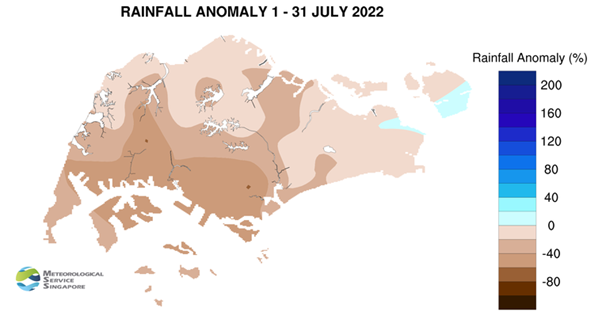Singapore, 1 August 2022 – The wet weather experienced in the second half of July 2022 is expected to continue into the first fortnight of August 2022. The prevailing Southwest Monsoon conditions are forecast to persist over Singapore and the surrounding region with the low-level winds blowing from the southeast or southwest.
2 In the first half of August 2022, short-duration thundery showers are expected over some parts of Singapore, between the morning and early afternoon on most days. On one or two days, large-scale convergence of winds over Singapore and the surrounding region may cause widespread moderate to heavy thundery showers. In addition, Sumatra squalls from the Strait of Malacca may bring widespread thundery showers with occasional gusty winds in the pre-dawn and morning on a few days. The total rainfall for the first fortnight of August 2022 is forecast to be above average over most parts of the island.
3 The daily temperature on most days in the first fortnight of August 2022 will likely range between 24 degrees Celsius and 33 degrees Celsius. On one or two rainy days, the daily minimum temperature may dip to around 23 degrees Celsius. In the latter half of the fortnight, the daily maximum temperature could reach a high of around 34 degrees Celsius on a few days. Relatively warm and humid nights with minimum night-time temperatures of up to 28 degrees Celsius can be expected on a few days, particularly over the eastern and southern coastal areas of the island, when the prevailing southeast winds bring warm and humid air from the surrounding seas.
4 For updates of the daily weather forecast, please visit the MSS website (https://www.weather.gov.sg), NEA website (www.nea.gov.sg), or download the myENV app.
REVIEW (1 – 31 July 2022)
5 In July 2022, Southwest Monsoon conditions prevailed over Singapore and the surrounding region, and the low-level winds blew mostly from the southeast or southwest. There were some days when the winds blew from the west.
6 The second half of July 2022 was wetter than the first half of month. Thundery showers fell over parts of the island between the late morning and afternoon on several days due to strong day-time heating of land areas. On 22 July 2022, the convergence of prevailing winds over Singapore and the surrounding region brought moderate to heavy thundery showers over many parts of the island in the afternoon. The total rainfall of 56.8mm recorded at Jurong West that day was the highest daily total rainfall recorded for July 2022. There were a few days where Sumatra squalls brought widespread thundery showers in the morning. On 20 July 2022, two spells of Sumatra squalls brought heavy thundery showers and gusty winds over many parts of Singapore in the early hours and morning.
7 The daily maximum temperature ranged from 31.1 degrees Celsius to 35.8 degrees Celsius in July 2022. The highest daily maximum temperature of 35.8 degrees Celsius was recorded at Marina Barrage on 17 July 2022. The lowest daily minimum temperature in July 2022 was 21.6 degrees Celsius recorded at Admiralty during the passage of the Sumatra squalls in the early hours and morning on 20 July 2022.
8 The rainfall was below average for many parts of the island in July 2022. The highest rainfall anomaly of 0.4 percent above average was recorded at Changi. The anomaly was lowest at Jurong West at about 62 percent below average.
CLIMATE STATION STATISTICS
Long-term Statistics for August
(Climatological reference period: 1991 – 2020)
| Average daily maximum temperature: | 31.4 °C |
| Average daily minimum temperature: | 25.3 °C |
| Average monthly temperature: | 28.1 °C |
| Average rainfall: | 146.9 mm |
| Average number of rain days: | 14 |
Historical Extremes for August
(Rainfall since 1869 and temperature since 1929)
| Highest monthly mean daily maximum temperature: | 32.7 °C (2019) |
| Lowest monthly mean daily minimum temperature: | 23.0 °C (1962) |
| Highest monthly rainfall ever recorded: | 526.8 mm (1878) |
| Lowest monthly rainfall ever recorded: | 11.8 mm (2019) |

